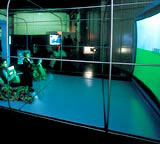Travelling lights
Portuguese collective Experimenta Design brings its modular exhibition Voyager to London. Miriam Cadji encourages us to visit the event

Think of Portugal and what comes to mind? Bottles of port? Golf courses and sprawling complexes on the Algarve? Salt cod and sardines? Chances are you simply draw a blank – after all, associations with Portuguese identity are so scant, it’s hard to believe that its capital played host to the World Exposition only three years ago. Besides Àlvaro Siza, the Pritzker Prize-winning architect who totally dominates the Portuguese design scene, there is little to immediately recommend Portugal as a centre of home-grown contemporary culture.
Hoping to change this perception, Lisbon-based collective Experimenta Design has co-ordinated Voyager, a modular travelling exhibition showcasing the work of more than 80 Portuguese designers and artists which debuted at April’s Milan Furniture Fair and comes to London this month.
Experimenta Design was set up in the spirit of self-promotion by product designer Guta Moura Guedes in 1998 when she recognised that fellow Portuguese designers needed a platform for their work. Since then it has broadened out to encompass all forms of visual art, design and architecture, encouraging a cross-disciplinary and collaborative approach.
Voyager’s true purpose is to act as a tease campaign for the main event: the second international Biennale on design culture, held in Lisbon on 16 September. A series of conferences, presentations, workshops and exhibitions will take place in the city over a six-week period, and UK-based participants include Zaha Hadid, Ron Arad and Thomas Heatherwick. Keen to promote Portugal on the international design circuit, the Portuguese minister of culture, José Sasportes, has lent his support to Voyager in the hope that it will attract visitors to see for themselves the major transformations.
Thanks to massive investment from the European government, Portugal is currently undergoing a dramatic process of regeneration. These changes have inevitably concentrated on its major cities: Lisbon and especially Porto, where a rash of new cultural and civic buildings and infrastructure systems is currently under construction. The two cities are characterised by an intriguing mix of shanty town, remnants of a rich historic past and straightforward commercialism, but when the dust has settled on the numerous building sites, Portugal could well be the next big destination for the design cognoscenti. Rem Koolhaas’s Music Hall and a new underground system, both in Porto, are among the highlights to be seen next year, when this northern Portuguese city hopes to prove itself worthy of the European City of Culture status (see www. porto2001.pt for more details), which it shares with Rotterdam throughout 2002.
So why has Portugal remained such a well kept secret? According to Biennale director João Paulo Feliciano, the reasons are largely economic and political. “We have a feeling of inferiority that comes from living under 50 years of fascist dictatorship,” he says. “That has been largely eradicated by the Expo which showed everyday people what a city can be.” Portugal’s emergence as a vibrant European democracy presents its design talent with a host of challenges and opportunities which are only now beginning to be addressed.
The names of those taking part in Voyager may not ring any bells and the work is likely to be unfamiliar to a UK audience, but the content is refreshing and positive. A curious hybrid between architectural spaces and complex, largescale objects, these installations are certain to spark some interest in what Portugal has to offer.
Voyager, Old Truman Brewery, 146 Brick Lane, London E1 from 9-17 June. www.experimenta design.pt
-
Post a comment



